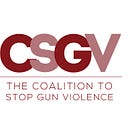Member-only story
In My Voice: I Experienced Gun Violence Firsthand and Struggled with My Mental Health. Now I’m Working to Help Others Address Both.
“Any time a black man is willing to talk openly about his mental health with his community, it plants a seed for change.”
Throughout Mental Health Month, we will be sharing Q&As with individuals who have experience with different aspects of mental health and gun violence. Today, we share a Q&A with James Braxton. James is a member of the planning/leadership committee of the Educational Fund to Stop Gun Violence’s Virginia Action Network. He is also the Strategic Engagement Director for RISE (Reinvest In Supportive Environments) for Youth — a statewide, nonpartisan initiative that advocates for the closure of juvenile prisons and reinvestment of resources back into impacted communities. He operates a resource center in Richmond for youth aging out of foster care called Positive Paths. He is also founder of “The Co-Parenting Empowerment Project” and a published author.
1. What do you do with the Virginia Action Network (VAN)? Why did you join?
I assist with the strategic planning and community-led initiatives such as the State of the Black Male. I network with a purpose and strengthen the…
